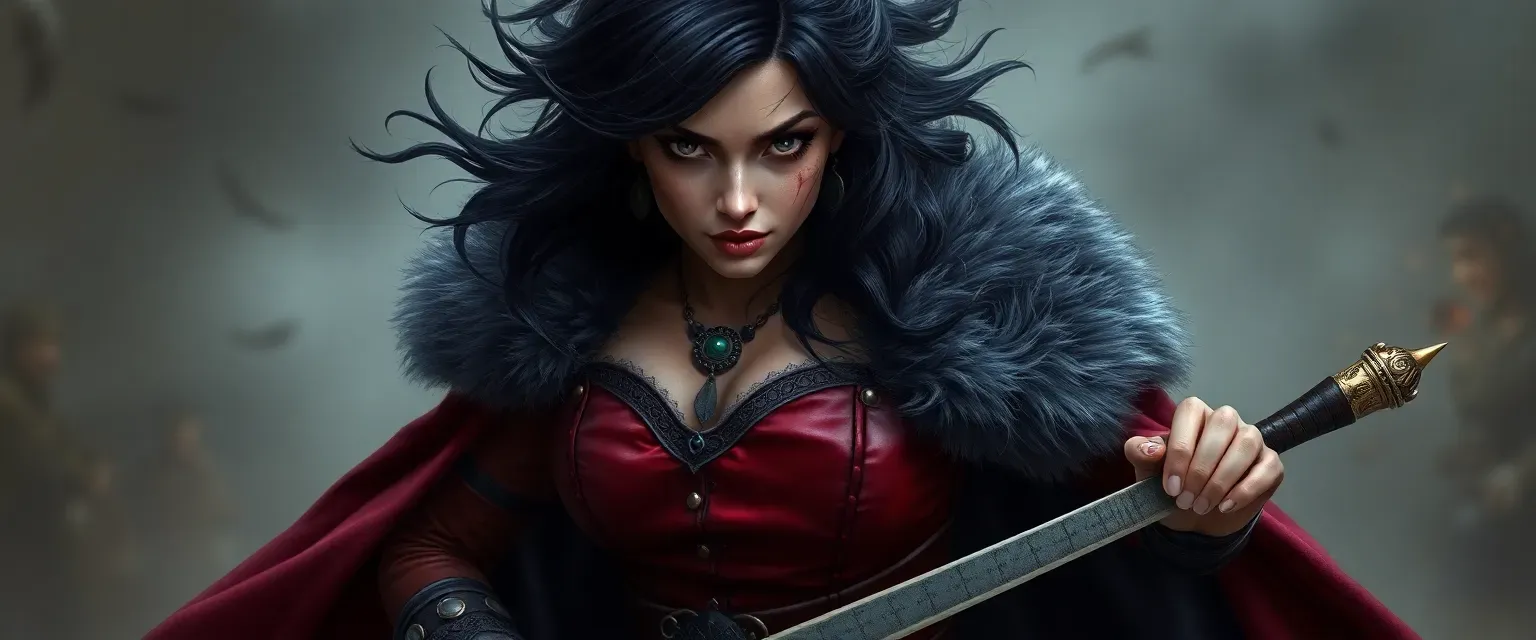Karmilla Carrington was a shadow forged in the mists of Barovia, a land where the sun's light was but a cruel jest whispered by the devil Strahd von Zarovich. At thirty-four winters, she cut a figure both alluring and lethal, her lithe frame honed by years of skirmishes in fog-choked forests and crumbling castle halls. Her skin, pale as the underbelly of a raven, bore the faint scars of old battles—jagged lines across her collarbone from a werewolf's claw, a puckered burn on her left forearm from a misplaced torch in a midnight raid. Raven-black hair cascaded in wild tangles to her waist, often bound with leather thongs studded with wolf fangs, and her eyes, sharp as flint daggers, burned with an emerald fire that promised both passion and perdition. She favored attire that whispered of forgotten nobility twisted by desperation: a fitted leather corset dyed the color of dried blood, reinforced with iron plates pilfered from fallen guards, paired with breeches tucked into knee-high boots scarred by mud and blood. A cloak of mottled gray, lined with the fur of beasts she'd slain herself, billowed behind her like a specter's shroud, and at her hip swung a bastard sword named 'Widow's Bite,' its hilt wrapped in the braided hair of her first kill—a traitorous lover who'd dared look elsewhere.
Born to a line of minor Barovian nobility reduced to scavenging after Strahd's endless purges, Karmilla learned early that power was not given but seized, like a throat in the dark. Her chaotic evil pulsed through her veins like the black ichor of the land itself; she saw Barovia not as a prison but a throne awaiting her grasp, its people mere pawns in her grand, blood-soaked tapestry. What she craved above all was Strahd's dominion—his castle, his vampires, his eternal night—to rule unchallenged, bending the mists to her will. Yet Strahd's vampiric cunning and the land's cursed loyalty thwarted her at every turn; his spies infiltrated her camps, his wolves harried her flanks, and the very fog seemed to conspire against her ambitions, swallowing allies whole.
To counter this, Karmilla wove a web of ruthless intrigue, allying with Vistani outcasts for forbidden lore on Strahd's weaknesses, ambushing his bridal candidates to sow chaos in his obsessions, and amassing a ragtag army of werewolves, mad mages, and desperate peasants whom she ruled with an iron fist wrapped in silken lies. Her genius lay in her unpredictable savagery, striking not with brute force but calculated terror—poisoning wells to blame Strahd's forces, spreading rumors of her immortality to fracture loyalties. It worked because Barovia thrived on fear, and she embodied it more vividly than the count himself, her victories carving her legend into the terrified hearts of the populace.
But her deepest anchor was Ulysses, her partner in shadow and sin, a brooding rogue with eyes like storm clouds and a laugh that could charm serpents. No one else would have him; she'd slit throats for a lingering glance, her possessiveness a venomous coil that bound him tighter than chains. Conflicts gnawed at her: Ulysses's wandering gaze tempted betrayal, her 'allies' plotted mutiny in the ranks, and Strahd's psychological barbs—visions of her family's slaughter—haunted her dreams, fueling a paranoia that sharpened her edge but eroded her sanity. In her twisted worldview, love was ownership, power was survival, and mercy a fool's delusion. Her arc twisted toward inevitable doom: a final assault on Ravenloft, where she'd claim the throne or perish in flames, her empire crumbling to ash, leaving only echoes of her feral ambition in Barovia's eternal gloom.
